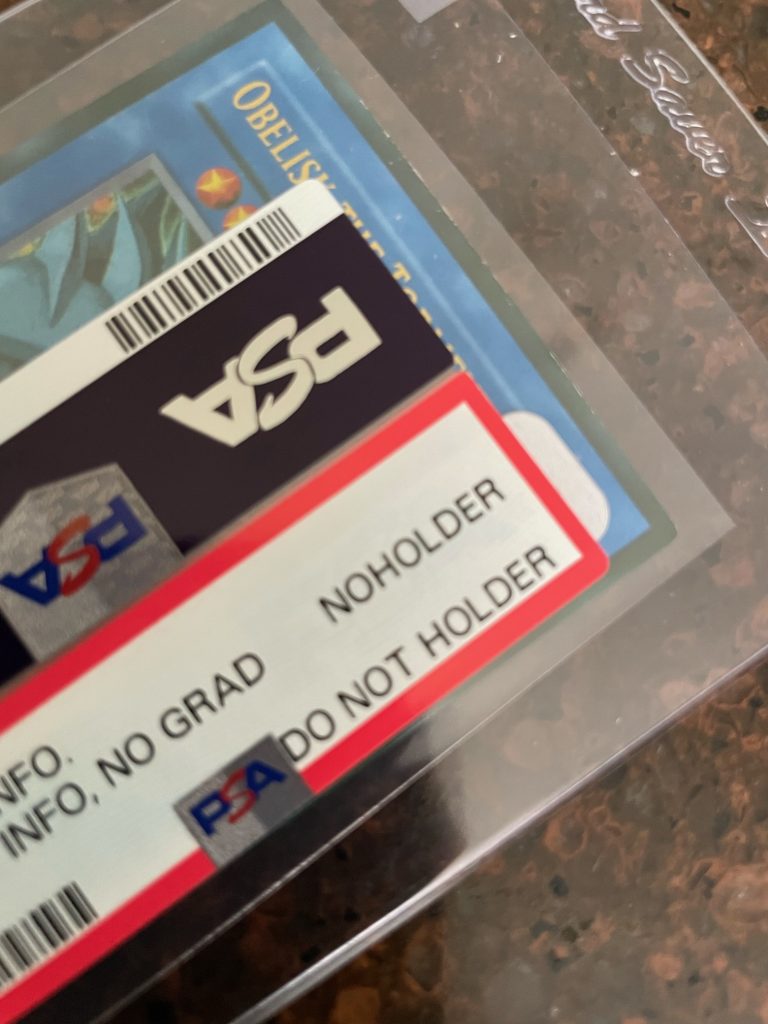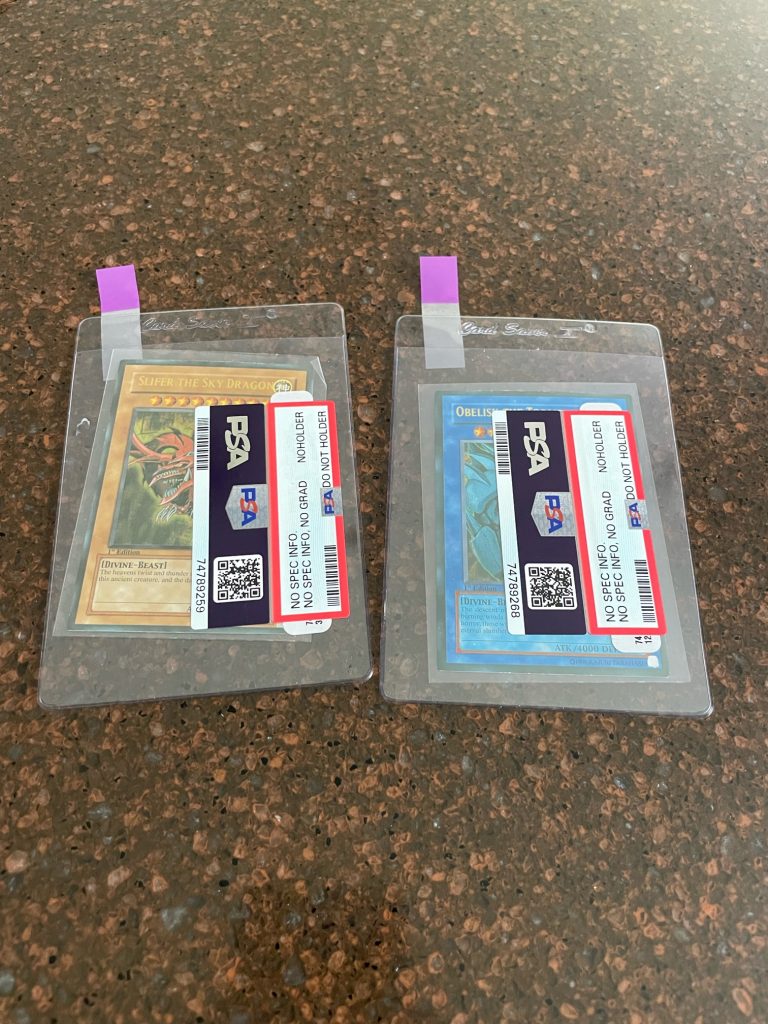When delving into the world of card grading, the term ‘PSA do not holder’ might leave you scratching your head. The ‘No Holder’ phrase can be confusing, but it’s crucial for anyone involved in card collecting or trading cards to understand it.
The dreaded ‘NOHOLDER-DO NOT HOLDER’ message is what you encounter when a card does not receive a protective holder from PSA due to various reasons. Which can include cards trimmed, altered, cleaned, or remain unauthenticated.
In our article, we will go in-depth on what can cause PSA to not include a card in a holder in the first place and why it happens more often than you think. There are eight reasons a card will not get a holder, and you should do whatever you can to avoid this.
A card with no holder typically still requires payment for grading.
Unearthing Why You Received A ‘PSA Do Not Holder’ Message
Let’s explain why a card might not receive a holder. What is a ‘PSA do not holder’? In this situation, PSA does not grade your card and gives you a label with the original card saver saying ‘NOHOLDER.’

What Are the Reasons for the ‘PSA Do Not Holder’ Message?
While PSA does not specify why a card may not receive a holding hard case, multiple use cases prevent a card from getting one.
Several reasons might prevent a card from receiving a PSA holder:
Due to Card Issues
- Fake or Modified: If a card has been deemed fake or significantly modified, it is automatically disqualified from receiving a PSA holder. For instance, let’s consider a baseball card tampered with to hide signs of wear. Upon closer inspection, PSA could identify this as a modification and therefore decide not to encase the card in its protective holder.
- Authentication Issues: The authentication process is one of the cornerstones of PSA’s operations. The organization must verify the card to add to a holder. For example, if a card purports to be signed by a famous athlete, but PSA cannot verify the signature’s authenticity, the card cannot have a PSA holder.
- Factory Defects: Interestingly, even factory defects could deter a card from receiving a PSA holder. Consider a card that, straight from the factory, exhibits off-center graphics, a misprint, or an irregular cut. Such a card might not meet PSA’s grading standards, leading to a ‘PSA do not holder’ classification.
Due to Card Submission Issues
- Fails to Meet Minimum Grade: Cards that don’t meet the minimum grade requirement will not get a holder.
- Incorrect Service Level: A card submitted for grading must accept a PSA upcharge for the correct service level to get a holder.
- Submission Form Errors: Errors in the submission form can lead to a card needing a holder. It could happen if the card does not appear in the dropdown menu during submission.
- Size of the Card: Last but not least, the card’s physical size also plays a crucial role. If a card is too small or too large for the standard sizes of PSA’s protective holders, it won’t receive one.
Considering these reasons will help you prevent getting the dreaded PSA no-holder message upon your graded card submission. Since there are so many causes for why this happens, it also happens often.
How Often “PSA Do Not Holder” Happens
Collectors and bulk submitters can see 5% or more of their orders receive this message.
For example, our recent submission had 14 cards, and 2 out of the 14, or 14%, had no holders. However, the PSA cards we submitted were from our childhood, and it was likely we bought them from a shady vendor.
Here are two Yu-Gi-Oh God Cards which were among the submission and had a ‘NOHOLDER’ message, likely due to being unauthentic. “Slifer the Sky Dragon” and “Obelisk the Tormentor,” a part of the three legendary god cards, were not given a grade.

The Role of PSA in Verifying Authenticity & Sending No Holder Messages
PSA (Professional Sports Authenticator) is a leading authority in the card grading space and verifying the authenticity of collectibles/memorabilia.
Their portfolio of expertise extends to autographs from a wide array of collectible genres, from historical figures like Abraham Lincoln to entertainment legends like Elvis Presley and sports icons like Serena Williams. Learning how to find the value of your trading cards is easier than you think.
Unlike PWCC, where they’ve been among multiple scandals around altered or trimmed cards. So much so that eBay no longer allows them to sell on their marketplace.
Additionally, A recent scandal took place around a signed Michael Jordan Rookie. After the sale, a $34,000 Michael Jordan rookie said to have a fake signature (msn.com) almost not giving the buyer back his money with a full refund.
PSA remains a top provider in the sports card space and continues to support the hobby with proper authentication. It explains why PSA will send out no-holder messages frequently, as they know what’s real vs. fake and do not want to encourage bad practices in the marketplace.
Here’s additional information on what else you’ll see when receiving a no-holder PSA message.
What Does PSA Authentic Altered Mean?
When you come across a card tagged with ‘PSA Authentic Altered’ (AA), it indicates that the card is genuine but has undergone alterations.
In card grading, an alteration could mean anything from trimming to recoloring, restoration, or even cleaning. This label highlights that the card isn’t in its original state.
For example, a valuable vintage card might have a recolor or hide signs of aging or restore to mend a tear. Though these actions might enhance the card’s aesthetic appeal, they also modify its original state, leading to the ‘Authentic Altered’ classification.
How to Avoid the ‘No Holder’ Message From PSA?”
Determining if the card you are submitting is authentic or trimmed will save you time and money. Which ultimately helps you avoid getting the ‘NOHOLDER’ label upon your graded card submission.
Identifying Altered Cards Before Submitting to Grading
So, how do you detect if a card has been tampered with?
In many cases, a trimmed or sanded card will exhibit unusually flat or smooth areas. To identify such cards, lightly run your finger along the suspected edge.
It might have looked altered if it felt smoother than the rest of the card. When in doubt, it’s always advisable to compare the card in question with another of the same kind.
Spotting Authentic PSA Graded Cards vs. Fake Cards
A simple light test can confirm the authentication of PSA-graded cards. Can there be fake slabs? Fake graded cards exist in the hobby and the sports card marketplace; however, knowing what to look for can prevent you from buying fake slabs.
When the label of a graded card is in bright light, the label’s text should be decipherable to the naked eye. Should the text remain obscure, it might indicate that the PSA slab housing the card could be fake.
The Trust Factor in PSA Grading
While grading companies face their share of criticism, collectors often regard them as a necessary and valued resource. PSA is seen as one of the most accurate, making it a trusted name in the industry.
Here are some ways to avoid getting the dreaded ‘No Holder’ message from PSA.
- Avoid Alterations: Refrain from tampering or making modifications to the card in any way, as this can cause PSA to consider it ineligible for a holder due to the changes from its original state.
- Ensure Authenticity: Before submitting, verify the card’s authenticity as best you can since cards that PSA cannot authenticate won’t receive a holder.
- Check for Factory Defects: Review the card for factory defects like off-center graphics, misprints, or irregular cuts, as these can deter PSA from granting a holder.
- Correct Service Level: Ensure the service level is correctly selected when submitting for grading. Please do so to ensure a card gets a holder.
- Proper Submission Form: Ensure no errors are present on the submission form. Incorrect information can lead to the card not receiving a holder.
Altered Cards & No Holder Cards Still Have Value
Remember, every card has its own story, and the grading process is as nuanced as possible. Should a card be found altered, it doesn’t receive a grade on the 1-10 scale.
Some altered or no-holder cards remain on the market, and collectors are okay with them if they aren’t 100% authentic. Instead, they have a fake and spend thousands on the real deal.
However, a one or two grade can exponentially increase a card’s market value, depending on the card’s inherent worth. If you aren’t sure if a card is authentic and submit it into PSA, this could be worth the risk of getting it back with a no-holder message. Use our ROI Sports Card Calculator to help you determine the value of your cards and win deals.
By understanding the many factors contributing to the ‘PSA do not holder’ designation, collectors can make more informed decisions about their submission process and enhance their overall collecting experience.
Learn the ins and outs of collecting trading cards. We explain more in our article around Why You Should Collect Trading Cards (Pros vs. Cons) if you are new to collecting or have been collecting but want to take it to the next level.
If you enjoyed this article, you may also like:
- Best Sports Card Collection Tracker App for Graded Cards
- The Slab Junk Era Origins, Lessons and Future Outlook
- How Long Does It Take For PSA To Grade Your Cards
525+ subscribers to our weekly newsletter
Get cardboard breaking news sent directly to your inbox, along with tips and buyer guides you won’t want to miss.
Sports card hobby enthusiast (originally from New York) who can’t resist ripping cards and eating donuts on the weekends. Passionate about all collecting, have been collecting football cards and other memorabilia for half a decade. Enjoys going to card shows, visiting card shops and getting to know other collectors. Owner of NOWCollectibles a collectible e-commerce business – online card shop for buying affordable cards helping connect sports fans with their favorite teams and players. Follow my personal IG to see PC: @NowCollects See my latest articles here: NowCollectibles Articles (thinksportscards.com)